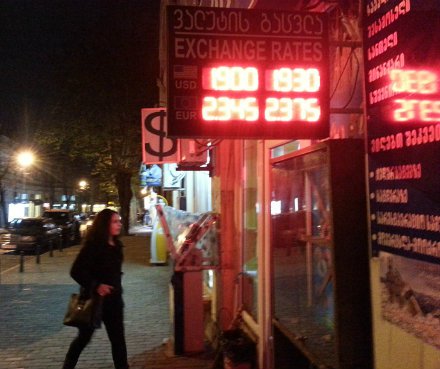
New Economic Data Show Georgia’s Deepening Economic Malaise
Publication: Eurasia Daily Monitor Volume: 13 Issue: 22
By:

On January 29, the National Statistics Office (NSO) of Georgia released new economic data, which shows that in 2015, the country’s GDP grew by just 2.8 percent, significantly less than its 4.6 percent growth from 2014 (Geostat.ge, January 29). In fact, for a lower middle income country like Georgia, whose overall annual GDP measures only $16.5 billion (Worldbank.org, accessed February 2), economic growth of 2.8 percent essentially translates to stagnation.
However, this is not Georgia’s only problem. On January 26, the Georgian lari fell to 2.53 against the United States dollar, hitting an all-time low in the national currency’s almost 21-year history (Civil Georgia, January 26). The value of the Georgian lari has been falling almost uninterrupted since fall 2013. Overall, it dropped roughly by 60 percent, wiping out thousands of Georgians’ meager savings and pushing even more of the population below the poverty level.
Georgia’s international trade is also worsening. In 2015, exports shrank by 23 percent, while imports reduced by 10 percent. In the same year, the country’s overall trade deficit reached 56 percent (Channel 1 TV, January 24).
Extremely high unemployment, a regular trend for the last 25 years, remains Georgia’s chronic problem under the current government, as well. According to the NSO’s latest data, unemployment stands at 12.4 percent (Geostat.ge, accessed February 2). However, this figure does not include roughly 55 percent of Georgia’s labor force, which lives in poor rural areas, and struggles to survive off its impoverished farmlands. In fact, this part of the Georgian population is essentially unemployed; yet, successive Georgian governments (and the NSO) consistently register them as self-employed, thus artificially bringing down official figures of unemployment to roughly 12–15 percent. If unemployment in rural areas were included, the national figure would have stood at a staggering 60–65 percent.
Georgia’s current economic troubles have deep structural causes, stretching back to the turbulent years following the collapse of the Soviet Union. First, the country’s economic infrastructure was either destroyed in the civil war at the beginning of the 1990s or plundered and sold for scrap by armed militias. The Georgian economy collapsed during those early years, with GDP shrinking almost by 300 percent in 1991–1995 (Worldbank.org, accessed February 2). And its ruined infrastructure has not yet truly recovered.
Second, Georgia desperately lacks skilled labor. Old professional cadres either died or left the country in search of jobs and a better life. Unfortunately, the Georgian higher education system has also been in deep crisis since early 1990, and has been unable to produce effective new professional cadres. None of Georgia’s universities come anywhere close to reaching the level of the world’s top universities (Edu.aris.ge, October 1, 2014). The only way for Georgian youth to acquire a quality education has been to study abroad, mainly in the United States. However, those educated in the West are often not willing to return and work in their home country. “As a professional, I would not survive in Georgia, where nepotism and personal ties rule and various business and political clans control everything… I really do not have a good reason to go back,” Alexander Sharashenidze, a recent Georgian graduate of a US-based business school, told this author (Author’s interview, January 31). In addition to the lack of skilled labor, perpetual internal political instability as well as Russia’s continued occupation of 20 percent of Georgian territory are additional factors that scare off investors and deprive the country of much-needed investments.
One relatively bright spot remains Georgia’s tourism industry. Former president Mikhail Saakashvili’s administration, which managed to generate some economic growth in 2003–2008 (Nbg.gov.ge, 2010), had tried to capitalize on the South Caucasus country’s stunning natural beauty and unique Georgian cuisine. Moreover, it heavily invested in developing tourism infrastructure. However, the 2008 Russian-Georgian war and the following global financial crisis hit Georgia hard, shrinking the country’s economy by almost 4 percent in 2009 alone (Tabula.ge, October 23, 2013). Georgia never fully recovered from the economic crisis. And while the country still attracts some tourists today (mainly from the former Soviet Union) because of its cheap, affordable prices, Georgia’s tourism sector remains in dire need of improvement as it lacks high-quality hotels, restaurants, and often the most basic infrastructure in resort cities and towns.
The new prime minister, Giorgi Kvirikashvili, appears not to have a coherent plan for how to tackle the country’s deepening economic malaise. He has stated that Georgia would follow the path of Estonia’s economic reforms, which brought that nation quite remarkable success after the Soviet collapse (Channel 1 TV, January 24). However, Prime Minister Kvirikashvili never elaborated how he would adjust Estonia’s experience to Georgian realities and needs. His plan sounds more like empty political rhetoric than a workable strategy.
Surprisingly, Georgia’s continuing economic troubles have not necessarily translated into political gains for the political opposition so far. For instance, in the January 28 elections for the gamgebeli (a district governor) of Gardabani municipality, the ruling Georgian Dream (GD) coalition candidate soundly defeated the candidate from former president Saakashvili’s United National Movement (UNM) (Cesko.ge, January 29).
Nevertheless, one can increasingly observe the growth of overall public anger in Georgia: it is noticeably spreading even among the large segments of the country’s young professionals, against the domestic business and political establishment. “Georgian business and political elites—a very small percentage of the country’s overall population—lead an extremely luxurious lifestyle, while the vast majority of people live in miserable conditions and struggle to get by on a daily basis. Looking at them, one might think that those elites live somewhere in Norway or Switzerland, not in an impoverished third-world country, such as Georgia,” complained Levan Pipia, a 27-year-old Georgian banker from Tbilisi (Author’s interview, January 30).
As Georgia’s economic malaise deepens, the ruling elites will need to immediately come up with a workable economic strategy in order to effectively address this impoverished and vulnerable country’s multiplying problems. So far, they have not shown sufficient creativity in their responses. And it remains to be seen what they will offer the public over the next year.




